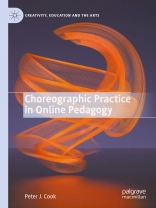This book examines a creative approach to exploring choreographic practice artistically, theoretically, and pedagogically. It explores the interweaving of dance, dance teaching, dance onto-epistemologies, and choreography with a particular focus on creating dance with digital technologies. The idea of centring choreography in dance education fundamentally challenges typical conceptions of best practice in the preparation and delivery, appropriateness, and effectiveness of dance performance, teaching and learning experiences. It purposefully privileges creativity as a critical learning paradigm, extending the ways in which creativity studies are enriching performance scholarship as well as performance teaching. The book acknowledges the importance of the artist teacher nexus and presents choreographic practice as the centre of learning in dance, with a focus on digital platforms.
Tabla de materias
1: ENTERING THE RHIZOME.- 2: LEARNING THROUGH TECHNOLOGY IN DANCE.- 3: CENTRING CHOREOGRAPHIC PRACTICE IN DANCE LEARNING.- 4: A/R/TOGRAPHY AS THEORY.- 5: INITIAL RUPTURES OF CHOREOGRAPHIC PRACTICE.- 6: THE AUSTRALIAN DANCE PLATEAU.- 7: THEORIES OF CHOREOGRAPHIC PRACTICE.- 8: A LIVING INQUIRY.- 9: METHODS OF MOVEMENT.- 10: THE ARTISTS’ WORKS.- 11: APPLYING A/R/TOGRAPHIC RENDERINGS TO THE ARTISTIC WORKS.- 12: THE TEACHERS’ WORKS.- 13: APPLYING A/R/TOGRAPHIC RENDERINGS TO THE TEACHERS’ WORKS.- 14: SPACE TIME DYNAMICS.- 15: UNDERSTANDING THE MULTIPLICITIES.
Sobre el autor
Peter J. Cook is Head of School and Dean, Education, at the University of Southern Queensland, Australia. His research is primarily centred on understanding learning through, dance, education and creativity and their associated practices. Additionally, Peter’s work is informed by his vast experience in initial teacher education and extending into creativity in leadership.












